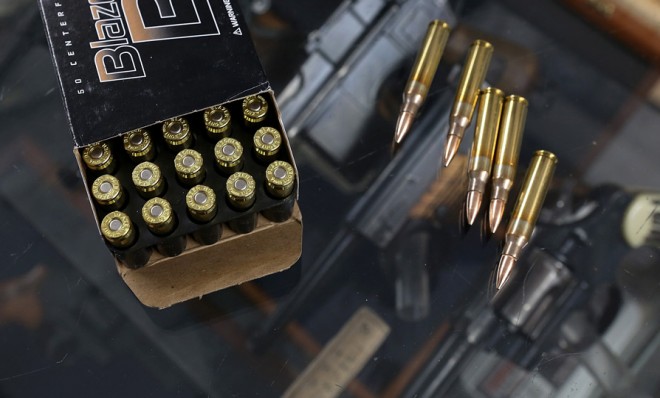Are high taxes on firearms an effective form of gun control?
Lawmakers look to Chicago's new $25-per-gun tax for inspiration

A free daily email with the biggest news stories of the day – and the best features from TheWeek.com
You are now subscribed
Your newsletter sign-up was successful
If you can't ban them, tax them. Last week in Chicago, consumers started paying a $25 tax on every firearm. Similar measures are being considered in California, New Jersey, and Maryland.
Taxing guns isn't a new idea. In fact, there is currently a 10 percent federal excise tax on pistols and revolvers, and an 11 percent tax on bullets and other firearms, according to Politico.
Similar "sin taxes" have been used to curb smoking. New York City claims it lowered its smoking rate to 14.8 percent in 2011, from 21.5 percent in 2002, thanks largely in part to the $5.85 in state and local taxes tacked on to every pack of cigarettes.
The Week
Escape your echo chamber. Get the facts behind the news, plus analysis from multiple perspectives.

Sign up for The Week's Free Newsletters
From our morning news briefing to a weekly Good News Newsletter, get the best of The Week delivered directly to your inbox.
From our morning news briefing to a weekly Good News Newsletter, get the best of The Week delivered directly to your inbox.
Other city and state governments are looking to emulate that success with guns. Nevada state assembly Majority Leader William Horne has proposed a $25-per-gun tax; New Jersey's Connie Wagner wants a 5 percent gun tax to fund security in public buildings; and California is looking to pass a 5-cent tax on bullets.
New gun taxes also have the advantage of funding dry state coffers. The $25 tax in Chicago and surrounding Cook County is expected to bring in $600,000 a year, according to CBS Chicago. California Assemblyman Roger Dickinson told Politico that the proposed nickel tax could result in $50 million in annual revenue.
But would they actually prevent gun violence? The Los Angeles Times' editorial board doesn't think so:
Guns cost a great deal more than cigarettes. A 5 percent tax on a $300 handgun amounts to an extra $15. A person bent on mass murder would hardly be discouraged by a low gun tax, and it would take many years for the higher retail costs to filter down to the criminal market in second-hand guns; moreover, a criminal who needs a gun as a primary tool of his trade would hardly be put off by a slightly higher price. [Los Angeles Times]
Kelly Phillips of Forbes agrees, asking, "Is there a genuine thought process that goes on that makes a potential murderer think, 'Well, I would kill both of those folks but that extra five cents on the second victim would just be too much? I have to save up this month.'"
A free daily email with the biggest news stories of the day – and the best features from TheWeek.com
In other words, unless you are going to follow Chris Rock's (somewhat joking) advice and raise the price of every bullet to $5,000, you are probably not going to stop people from buying them.
Lawmakers argue that this isn't de facto gun control. Instead, it's being framed as a way to pay for law enforcement and the medical care of gunshot victims.
Jon Cardin, a Maryland state delegate from Baltimore who wants to tax bullets at 50 percent, tells Politico, "I'm not asking to take away people's guns, I'm just saying that for an activity that is relatively dangerous, obviously, people who participate in that activity should pay the full costs of that activity."
Still, legislators will have to contend with the objections of gun rights activists, who see the new taxes as an attack on their rights. Lawrence Keane, general counsel of the National Shooting Sports Foundation, told USA Today that taxes on firearms are "a coordinated effort by gun-control groups to try to impose a poll tax on the exercise of the Second Amendment."
Keith Wagstaff is a staff writer at TheWeek.com covering politics and current events. He has previously written for such publications as TIME, Details, VICE, and the Village Voice.
-
 Gisèle Pelicot’s ‘extraordinarily courageous’ memoir is a ‘compelling’ read
Gisèle Pelicot’s ‘extraordinarily courageous’ memoir is a ‘compelling’ readIn the Spotlight A Hymn to Life is a ‘riveting’ account of Pelicot’s ordeal and a ‘rousing feminist manifesto’
-
 The EU’s war on fast fashion
The EU’s war on fast fashionIn the Spotlight Bloc launches investigation into Shein over sale of weapons and ‘childlike’ sex dolls, alongside efforts to tax e-commerce giants and combat textile waste
-
 How to Get to Heaven from Belfast: a ‘highly entertaining ride’
How to Get to Heaven from Belfast: a ‘highly entertaining ride’The Week Recommends Mystery-comedy from the creator of Derry Girls should be ‘your new binge-watch’